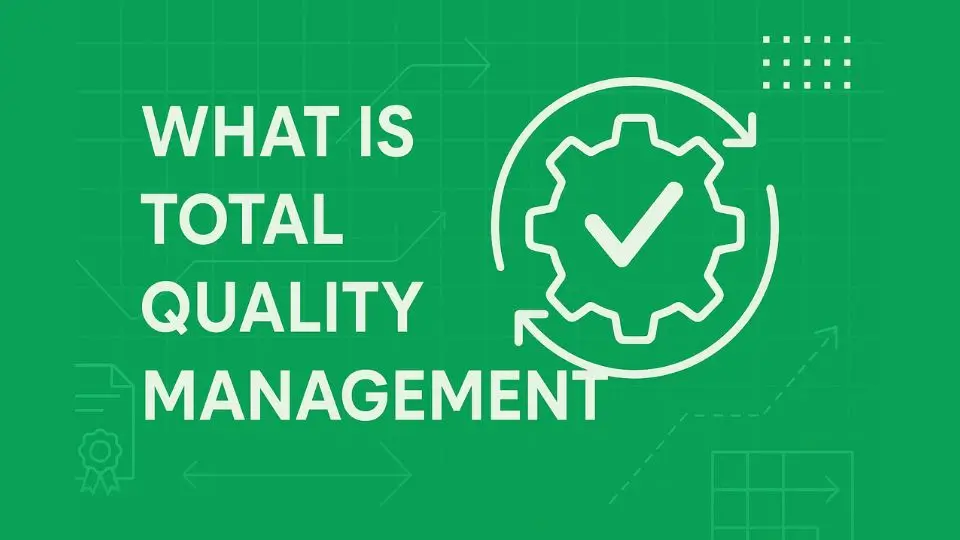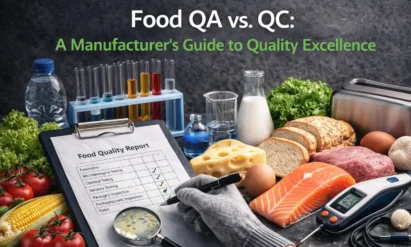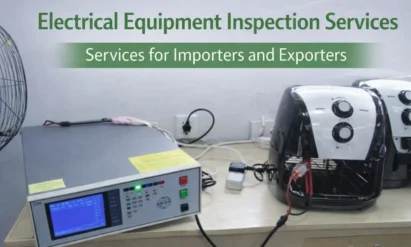What is Total Quality Management?
Sep 11,2025

Quality can be the key to a business’s success. While many organizations recognize its importance, consistently delivering quality can be a challenge. Total Quality Management (TQM) offers a practical solution.
It’s a company-wide philosophy that integrates quality into daily decisions, processes, and behaviors, ensuring customers get what they expect—and often more.
What Is Total Quality Management?
Total Quality Management (TQM) is a holistic management approach that aligns people, processes, and strategy, centered on continuous improvement.
The “holistic” element is crucial: quality isn’t the responsibility of a single department; it’s everyone’s responsibility, from the board of directors to the front-line employees.
In practice, TQM means deeply understanding customer needs, designing processes to meet those needs the first time, measuring results with data rather than intuition, and continuously improving the way we work.
Why Is Total Quality Management Important?
TQM matters because it turns quality from a reactive firefight into a proactive capability. When the organization aligns on customer needs and builds quality into processes, defect rates fall and the cost of rework, returns, and support shrinks.
Customers notice the difference, which shows up in higher satisfaction, repeat business, and a stronger reputation.
Internally, people are more engaged because they can see how their work contributes to better outcomes, and leaders gain a clearer view of performance through reliable data rather than anecdotes.
Over time, this combination of happier customers, leaner operations, and a more motivated workforce becomes a durable competitive advantage.
Characteristics of Total Quality Management
Successful Total Quality Management (TQM) practices often exhibit several characteristics. First, a strong focus on the customer: “Quality” begins with what customers value, not what’s easy to produce. Second, organization-wide engagement: Everyone participates in improving the way they work, and cross-functional collaboration replaces silos.
Third, process discipline. Instead of relying on final inspections to catch errors, teams stabilize and standardize processes, reducing the likelihood of errors from the outset.
Integrated management systems tie these practices to strategy, and an open culture of communication makes goals, progress, and lessons learned clearly visible.
Finally, decisions are based on facts. Performance is measured, variances are understood, and improvements are piloted and validated before being rolled out.
Key Principles of TQM
While different authors articulate these principles in varying ways, their core ideas remain remarkably consistent. Total Quality Management (TQM) begins with a relentless focus on customers and their key outcomes.
It requires full employee engagement, which means leaders create the conditions—training, clear processes, and recognition—that empower employees to improve their work.
It is process-centric, viewing each outcome as the product of a system that can be studied and improved. It is a comprehensive strategic approach, not a collection of side projects. It advocates for continuous improvement, utilizing iterative cycles to test ideas, study results, and identify effective approaches.
It relies on data to select problems and validate solutions. And it relies on clear, frequent communication so that people understand the “why” of change, not just the “what”.
How to Implement TQM?
Implementation isn’t about installing a toolkit; it’s about guiding a cultural transformation. A practical starting point is to assess your current quality posture: map key workflows, identify persistent issues, and listen to your customers.
From there, set measurable quality goals that are directly tied to business objectives—fewer warranty claims, faster turnaround times, higher first-time pass rates, and improved satisfaction ratings. Build capabilities by training your team in problem-solving methods and giving them the time and permission to improve processes.
Adopt an iterative cadence—many organizations tend to favor a “Plan-Do-Check-Act” cycle—piloting changes on a small scale, analyzing the data, and then standardizing what works. Throughout this process, leadership focus is crucial.
When senior management consistently monitors quality issues, reviews progress, removes obstacles, and celebrates achievements, the organization understands that Total Quality Management (TQM) isn’t a short-term initiative but the way the company operates.
Pros and Cons of TQM
The advantages of Total Quality Management (TQM) are clear. Because prevention replaces correction, organizations achieve more consistent quality, fewer defects, and lower overall costs.
Customers experience fewer problems and higher value, which fosters loyalty and increased word-of-mouth. Empowered with the skills and authority to improve their own work, employees become more engaged.
The main disadvantage is commitment. Meaningful TQM efforts require time, training, and persistence; while immediate results are possible, the greatest gains accrue over months or even years.
Total Quality Management Frameworks and Standards
Several established frameworks can help organizations translate Total Quality Management (TQM) principles into everyday practice. The ISO 9001 standard provides a widely recognized structure for a quality management system, including requirements for documented processes, internal audits, corrective actions, and management reviews.
Six Sigma offers a rigorous, data-driven approach to reducing variation, while Lean emphasizes eliminating waste and achieving a smoother flow of value.
Excellence models such as the Baldrige Framework provide standards that encourage organizations to connect leadership, strategy, customer understanding, employee engagement, operations, and measurable results.
Many companies blend these approaches, using ISO 9001 to formalize the management system, Lean to streamline processes, and Six Sigma to address stubborn sources of variation—all within the cultural framework of Total Quality Management (TQM).
Total Quality Management Systems and Tools
Tools are important, but in Total Quality Management (TQM), tools serve the mindset, not the other way around. When it comes to analysis, teams typically start with the classic quality toolkit. Checklists make real-time data collection easy.
Control charts help distinguish between normal fluctuations and signs of process drift. Flowcharts illustrate how work is actually being performed, which often differs from how it’s supposed to be performed.
In addition to paper-based tools, software is playing an increasingly important role. Quality management systems centralize documentation, audits, nonconformities, and corrective actions to ensure consistent and reliable information. Statistical process control can automate processes at the machine level and generate alerts when metrics exceed control limits.
Collaboration platforms and visual dashboards make improvement efforts visible and align cross-functional teams on priorities, owners, and deadlines. Techniques such as “5 Whys,” kaizen events, and benchmarking complement the data flow by encouraging disciplined curiosity and continuous learning.
Example of TQM in Practice
Consider the story of a global automaker that made quality a core element of its brand identity. Leaders invested in developing problem-solving capabilities at every level, encouraging employees to stop production immediately when defects were discovered and viewing each stoppage as an opportunity to improve the process rather than assign blame to a specific individual.
The company combined just-in-time production processes with rigorous root cause analysis, allowing problems to surface quickly and be addressed at their source. Over time, warranty claims declined, reliability ratings improved, and the market began to associate the brand with long-term value.
The transformation wasn’t a sudden change, but the compounding benefits of thousands of small improvements initiated and implemented by employees ultimately earned the company a reputation for quality that competitors struggled to match.
A similar pattern is emerging outside the automotive industry. A major steel producer, under intense competitive pressure, adopted Total Quality Management (TQM).
By engaging employees in structured improvement projects, benchmarking against global best practices, and leveraging data to prioritize work, the company reduced defects, increased production, and shortened delivery times.
The financial impact was clear and garnered recognition from leading quality organizations. The lesson from these stories is consistent: When leadership sets the tone, gives people the skills and authority to improve processes, and persists in learning from data, total quality management (TQM) becomes a practical engine for improving performance in any industry.
Conclusion
Total Quality Management (TQM) isn’t just a set of tools or a certification; it’s a business approach that sees quality as the result of well-designed processes, engaged employees, and continuous learning.
Organizations that embrace TQM earn customer trust through consistent delivery, cut costs by preventing issues instead of fixing them, and foster a culture of continuous improvement.
While the work is ongoing, the rewards—resilient operations, loyal customers, and a lasting competitive edge—make TQM one of the smartest long-term investments a business can make.
--- END ---
Products
Get A Free Quote
Related Blogs
QCC SAMPLE REPORT
For sample reports or custom checklists, please contact us – we're here to assist you.


 December 31,2025
December 31,2025

